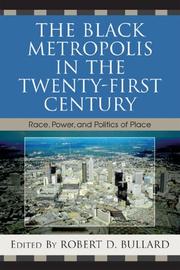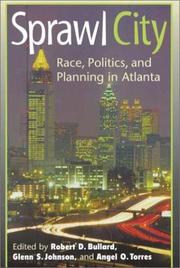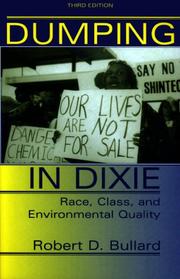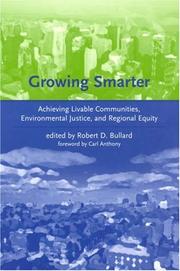| Listing 1 - 10 of 12 | << page >> |
Sort by
|
Book
ISBN: 0585331758 9780585331751 9780817305413 0817305416 0817305416 0817304258 9780817304256 Year: 1989 Publisher: Tuscaloosa
Abstract | Keywords | Export | Availability | Bookmark
 Loading...
Loading...Choose an application
- Reference Manager
- EndNote
- RefWorks (Direct export to RefWorks)

ISBN: 0742543293 0742571777 9780742571778 9780742543294 9780742543287 0742543285 Year: 2007 Publisher: Lanham, Maryland : The Scarecrow Press, Inc.,
Abstract | Keywords | Export | Availability | Bookmark
 Loading...
Loading...Choose an application
- Reference Manager
- EndNote
- RefWorks (Direct export to RefWorks)
This book brings together key essays that seek to make visible and expand our understanding of the role of government (policies, programs, and investments) in shaping cities and metropolitan regions; the costs and consequences of uneven urban and regional growth patterns; suburban sprawl and public health, transportation, and economic development; and the enduring connection of place, space, and race in the era of increased globalization. Whether intended or unintended, many government policies (housing, transportation, land use, environmental, economic development, education, etc.) have aided
City dwellers --- African Americans --- Blacks --- Sociology, Urban --- Urban geography --- Human geography --- Geography --- Negroes --- Ethnology --- Social conditions. --- Segregation --- Black persons --- Black people

ISBN: 1559637900 Year: 2000 Publisher: Washington (D.C.) : Island press,
Abstract | Keywords | Export | Availability | Bookmark
 Loading...
Loading...Choose an application
- Reference Manager
- EndNote
- RefWorks (Direct export to RefWorks)
African Americans --- Cities and towns --- Urban ecology (Sociology) --- Segregation --- Growth
Book
Year: 2004 Publisher: Geneva UNRISD
Abstract | Keywords | Export | Availability | Bookmark
 Loading...
Loading...Choose an application
- Reference Manager
- EndNote
- RefWorks (Direct export to RefWorks)

ISBN: 0813367921 Year: 2000 Publisher: Boulder Westview
Abstract | Keywords | Export | Availability | Bookmark
 Loading...
Loading...Choose an application
- Reference Manager
- EndNote
- RefWorks (Direct export to RefWorks)
African Americans --- Environmental policy --- Social justice --- Social surveys --- Waste disposal sites --- Social conditions --- Location --- Southern States --- Race relations.

ISBN: 9780813367927 Year: 2000 Publisher: Boulder, CO : Westview Press,
Abstract | Keywords | Export | Availability | Bookmark
 Loading...
Loading...Choose an application
- Reference Manager
- EndNote
- RefWorks (Direct export to RefWorks)
Justice environnementale --- Noirs américains --- Dépôts de déchets dangereux --- Conditions sociales.

ISBN: 1282097296 9786612097294 0262269538 1429457872 9780262269537 9781282097292 9781429457873 0262026104 9780262026109 0262524708 9780262524704 Year: 2007 Publisher: Cambridge, Mass. The MIT Press
Abstract | Keywords | Export | Availability | Bookmark
 Loading...
Loading...Choose an application
- Reference Manager
- EndNote
- RefWorks (Direct export to RefWorks)
Experts from academia, government, and nonprofit organizations offer an environmental justice perspective on Smart Growth, discussing equitable solutions to suburban sprawl and urban decay.
Cities and towns --- Sustainable development --- Environmental justice --- Social justice --- Regional disparities --- Minorities --- Growth. --- Civil rights --- Disparities, Regional --- Regionalism --- ENVIRONMENT/Environmental Politics & Policy --- URBANISM/General --- Sociology of environment --- Environmental protection. Environmental technology --- Environmental planning
Book
ISBN: 0814763847 9780814771938 0814771939 9780814763841 9780814799932 0814799930 Year: 2012 Publisher: New York New York University Press
Abstract | Keywords | Export | Availability | Bookmark
 Loading...
Loading...Choose an application
- Reference Manager
- EndNote
- RefWorks (Direct export to RefWorks)
When the images of desperate, hungry, thirsty, sick, mostly black people circulated in the aftermath of Hurricane Katrina, it became apparent to the whole country that race did indeed matter when it came to government assistance. In The Wrong Complexion for Protection, Robert D. Bullard and Beverly Wright place the government response to natural and human-induced disasters in historical context over the past eight decades. They compare and contrast how the government responded to emergencies, including environmental and public health emergencies, toxic contamination, industrial accidents, bioterrorism threats and show that African Americans are disproportionately affected. Bullard and Wright argue that uncovering and eliminating disparate disaster response can mean the difference between life and death for those most vulnerable in disastrous times.
Racism --- Racism in social services --- Racism in public welfare --- African Americans --- Disaster relief --- Social service --- Welfare racism --- Public welfare --- Disaster assistance --- Emergency assistance in disasters --- Emergency relief --- Emergency management --- Human services --- Social conditions. --- Civil rights. --- Social aspects --- Black communities. --- Katrina. --- climate change. --- disaster response. --- environmental justice. --- father of environmental justice. --- flooding. --- government assistance. --- government response to disaster. --- racial injustice. --- toxic waste.
Book
ISBN: 0429977484 0429497857 1283137607 9786613137609 0786744278 9780786744275 9780813344249 0813344247 Year: 2009 Publisher: Boulder, CO Westview Press
Abstract | Keywords | Export | Availability | Bookmark
 Loading...
Loading...Choose an application
- Reference Manager
- EndNote
- RefWorks (Direct export to RefWorks)
Analyzing the immediate and long-term repercussions of Hurricane Katrina, the essays in this volume expose the racial disparities that exist in disaster response and recovery and challenge the geography of vulnerability
Crisis management --- Disaster relief --- Emergency management --- Hurricane Katrina, 2005.
Digital
ISBN: 9780814763841 9780814799932 Year: 2012 Publisher: New York, N.Y. New York University Press
Abstract | Keywords | Export | Availability | Bookmark
 Loading...
Loading...Choose an application
- Reference Manager
- EndNote
- RefWorks (Direct export to RefWorks)
| Listing 1 - 10 of 12 | << page >> |
Sort by
|

 Search
Search Feedback
Feedback About UniCat
About UniCat  Help
Help News
News